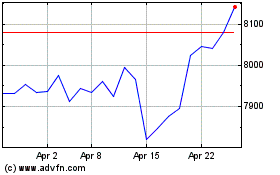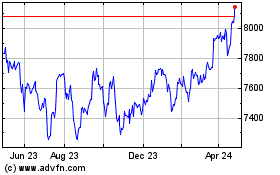Global Markets Buffeted Again By Virus Concerns
March 11 2020 - 5:09AM
Dow Jones News
By Frances Yoon and Anna Isaac
U.S. stock futures and Treasury yields fell on Wednesday,
pointing to sustained doubts about the ability of governments and
central banks to combat the economic headwinds caused by the
coronavirus.
Futures contracts tied to the Dow Jones Industrial Average fell
2%, suggesting U.S. stocks could open lower Wednesday. European
stock markets opened higher, with the Stoxx Europe 600 rising 1.3%.
The U.K.'s benchmark FTSE 100 was also up 1.2%, shortly after an
unexpected rate cut by the Bank of England.
Japan's Nikkei 225 declined 2.3% to close at its lowest level
since December 2018. Australia's S&P/ASX 200 dropped 3.6%,
hitting its lowest since January 2019, and entering a bear market,
typically defined as a decline of at least 20% from a recent
peak.
The market moves followed two tumultuous days marked by a
violent global selloff and a sharp rebound. U.S. stocks had soared
in frenetic trading Tuesday, wiping out much of the losses they
suffered just a day earlier in their biggest selloff since the
financial crisis. The S&P 500 rose 4.9%.
On Wednesday, the 10-year U.S. Treasury yield stood at 0.719%,
down from 0.743% on Tuesday. Bond yields, which move inversely to
prices, have swung wildly in recent days, with the widely watched
10-year yield tumbling from above 1% last Thursday to a record
intraday trough below 0.4% on Monday.
"It's too early to call this stabilization, and it's too early
to position for a rebound here," said Mayank Mishra, a global macro
strategist at Standard Chartered Bank in Singapore.
"Financial markets will continue to focus on the economic
implications from the virus, and right now the global outlook for
growth is not rosy. Those are the forces that markets are reacting
to," said Mr. Mishra.
The Bank of England announced an emergency cut to its main
interest rate Wednesday morning. The easing of monetary policy came
with other measures to support the economy, including cheaper
borrowing for small businesses.
The central bank's action follows a cut of the same magnitude by
the U.S. Federal Reserve last week. The European Central Bank is
due to meet on Thursday. With the ECB's key deposit rate already
negative, pressure is mounting on governments to offer fiscal
support in response to the virus's impact.
Mr. Mishra said while markets had already priced in likely
interest-rate cuts and other support from central banks, government
action moved at a slower pace. "The fiscal response is a
slower-moving beast, so let's see how that helps stabilize global
financial markets," he said.
The Federal Reserve earlier this month cut its key interest rate
by 0.5 percentage point to a range of 1% to 1.25%. Many investors
expect a further cut at the Fed's scheduled meeting next week,
which concludes on March 18.
A push by President Trump to suspend the payroll tax to boost
the economy fell flat on Capitol Hill on Tuesday, as lawmakers of
both parties said they preferred targeted measures to assist hourly
workers and the battered travel industry.
Write to Frances Yoon at frances.yoon@wsj.com and Anna Isaac at
anna.isaac@wsj.com
(END) Dow Jones Newswires
March 11, 2020 04:54 ET (08:54 GMT)
Copyright (c) 2020 Dow Jones & Company, Inc.
FTSE 100
Index Chart
From Mar 2024 to Apr 2024

FTSE 100
Index Chart
From Apr 2023 to Apr 2024
